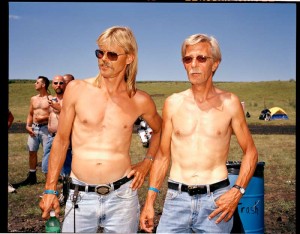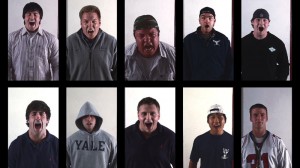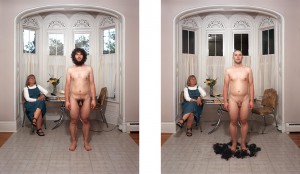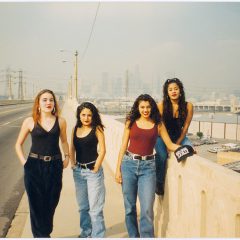The show White Boys, curated by artist Hank Willis Thomas and co-curator Natasha L. Logan at Haverford College’s Cantor Fitzgerald Gallery is a lively reminder that a wide range of art is social and that arguably all art is social. The show of work by 17 artists serves as an addendum to the previous show at the gallery of work by Thomas, whose own conceptual photography explores images of African-American men in popular culture.

The current show’s name is a bit of a red herring. Fortunately the art is strong enough to push well beyond stereotypes. And it’s worth noting that neither the artists nor the subjects of the art are all white boys. Nor are they all American. But white American young men of various persuasions do predominate.

Fraternity, by Richard Mosse, the first piece a viewer encounters approaching the show, features a grid of privileged-looking drunk young Yalies screaming at the camera. The screaming reaches a point of exhaustion–for them and for we who are viewing them. They are privileged to be brats, and please please please stop it and shut up! Mosse asked the fraternity group if they would drink, and then scream for his camera, which immediately simplifies and stereotypes the behavior. However the individual differences become salient in the course of the performance. (Here’s the video).

Disturbing in quite a different way is the performance video 30th Birthday Shave, by Noah Krell. In front of a group of onlookers, a naked Krell, having grown a wild beard and head of hair, has his mother shave it all off, including all body hair. The mom seems remarkably game and calm. It’s worth noting that Krell had a rural upbringing, so perhaps sheep shearing is part of his and his mom’s experience. That Krell’s mother is the shaver made me squirm–but it also made me aware of the animal identity that we all share, and the individuality of Krell and mater. The themes of this and of Krell’s video of himself carried piggy-back by a young woman who ultimately staggers and drops under his weight are surprising and wonderful, bringing breadth to the show.

Archival Inkjet print, 24 x 36”
The show also explores queer identities and a variety of identities that relate to otherness. Some photographs by Sean Fader of himself zipped into other bodies were fun partly for the how-did-he-do-it quality and the Cindy Sherman identity mutability factor. But they also asked the question of what it means to be a man.
On my way out, I stopped in a diaristic slideshow, The Ritual of Nothingness, 2012, by Brooklyn-based Chris Berntsen, of the punk, queer and skateboard communities in which he travels. As I stood looking at how these self-identified Other groups were hanging out together and blowing off steam, I was suddenly struck by a sad truth–that it’s a lot easier for white boys to behave badly for a while. We as a society don’t cut any slack at all for a young black man who behaves badly. He, we regard as so terrifying that we throw him in jail.
As I was leaving the show with this thought, I spotted Berntsen, who was there for the opening. I asked him if he knew Phil Jackson’s work (yes, he does; they know each other). I wanted to know if he was concerned about how the title White Boys would affect how people saw his work, a selection, he said, of images from his daily practice of taking pictures. He said he wondered about it, but was not overly concerned. He seemed happy to be there.
White Boys
Cantor Fitzgerald Gallery
to May 3, 2013









